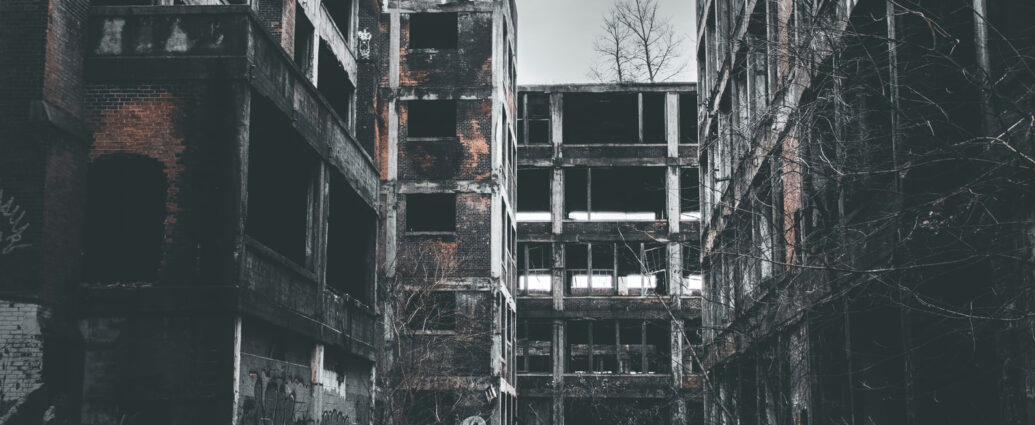Now that it’s over, Jaelyn Pierce doesn’t remember what it was for. Word came yesterday. After twenty years of global war, accord. The word sounds like the punchline of a bad joke. Jaelyn has spent her best years aiming down the scope of an assault rifle, seeing red. For what?
“Until lines are redrawn,” Colonel Ascott said this morning at briefing, “patrols are still needed.”
So Jaelyn patrols empty streets beneath shells of skyscrapers.
Hnh, lines, she muses as she goes. This is yours, this is mine. Cross it and I’ll kill you. Has no one learned a damn thing?
The pole of a traffic light lies across her path. Though the lights haven’t worked in years, she stops. Twisted behemoths of glass and steel groan, victims of assault. Gaping wounds in the sides of buildings expose private spaces. The results of what happens when a bunker-buster hits an apartment high-rise. It is an obscenity she hardly notices anymore.
It began with EMPs and cyber attacks, the kind of warfare that the Somebodies could claim (falsely) was casualty-free. But it wasn’t long before the missiles and chemicals and satellite lasers began to fall. The Somebodies lost their tempers, along with their patience to wage a well-mannered war.
The fallen light diverts Jaelyn onto the sidewalk. Rubble obscures the path, makes walking hazardous.
What did the city look like, before? It is hard to imagine. Sleek and shiny, orderly and clean. Wealth and plenty and comfort beyond imagining. Noisy with traffic and voices. Music maybe. She has heard rumors of intact cities run by warlords who use the fist to maintain the pre-war status quo, but she hasn’t seen them. Her infantry division is moved into cities after the shelling stops, so she is well-acquainted with ruins. To consider the loss, the bombed-out museums, the shattered cathedrals, the collapsed housing projects, is a no-no. A person can go crazy considering loss.
But with the accord, the world has entered a strange kind of limbo. Is it safe yet to comb through the wreckage and look for scraps of Rembrandts and Jesuses? Is it too early for families to emerge from bunkers? How soon might this twenty-year normal be replaced with something new, something sane? After all, what is a city without humanity?
The streets are silent. Shards of concrete crunch under Jaelyn’s boots. Somewhere down that alley a crow announces his lordship over his corner of the neighborhood. Someone has eaten all the pigeons. Weren’t pigeons a problem once? A nuisance, yes, that in the end saved thousands of lives by becoming a ready food supply.
When lines were established and new mascots chosen, humanity ought to put the sacrificial pigeon on its vain flags and golden crests. Jaelyn grins at the absurd idea.
Drones whir past. Their cloaks are turned off. For the first time in two decades, Jaelyn sees what they look like. Ugly things with too many legs, like spiders. They seek heat signatures. Not of enemies to be executed, but of survivors to be fished from the debris.
They won’t find any, not humans anyway. If Smash and Timms were here, Jaelyn would bet her supper ration that the last holdouts had fled. Gone north, gone underground. She hears it is bad in the refugee camps. Decades of bomb blasts and raging fires have smudged the sky the color of a coffee stain. Crops don’t like it. Nor do wildlife. Now the refugees eat each other. That’s what the reports say. She doesn’t know if it’s true. In the beginning, mobs tried to storm military commissaries and break into the food stores. They were shot for their trouble. Jaelyn knows that for a fact. Her superiors had ordered her to pass the order to her squad, so she had. She’d pulled the trigger herself.
~~~~~~
Read the rest of the story: first published by All Worlds Wayfarer, Issue IX, 2021, now available for download at Amazon.
copyright 2021 by Court Ellyn
None of the text may be copied, redistributed, or reproduced without written permission of the author.
